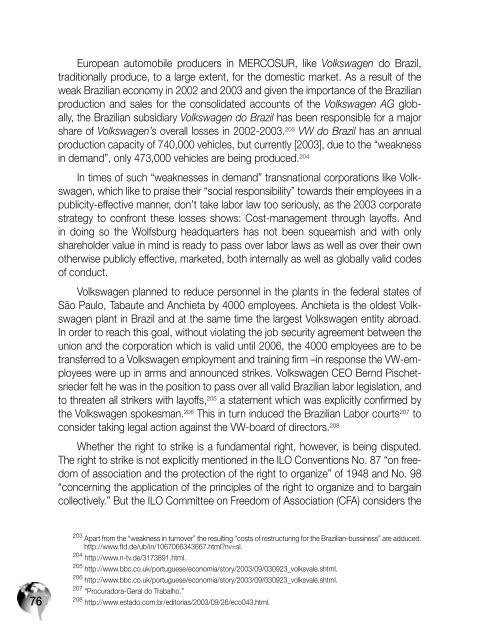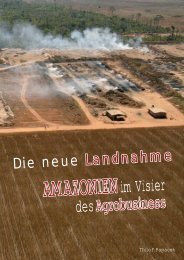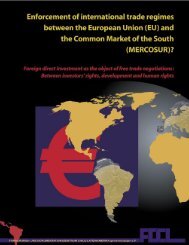Download - FDCL
Download - FDCL
Download - FDCL
You also want an ePaper? Increase the reach of your titles
YUMPU automatically turns print PDFs into web optimized ePapers that Google loves.
76<br />
European automobile producers in MERCOSUR, like Volkswagen do Brazil,<br />
traditionally produce, to a large extent, for the domestic market. As a result of the<br />
weak Brazilian economy in 2002 and 2003 and given the importance of the Brazilian<br />
production and sales for the consolidated accounts of the Volkswagen AG globally,<br />
the Brazilian subsidiary Volkswagen do Brazil has been responsible for a major<br />
share of Volkswagen’s overall losses in 2002-2003. 203 VW do Brazil has an annual<br />
production capacity of 740,000 vehicles, but currently [2003], due to the “weakness<br />
in demand”, only 473,000 vehicles are being produced. 204<br />
In times of such “weaknesses in demand” transnational corporations like Volkswagen,<br />
which like to praise their “social responsibility” towards their employees in a<br />
publicity-effective manner, don’t take labor law too seriously, as the 2003 corporate<br />
strategy to confront these losses shows: Cost-management through layoffs. And<br />
in doing so the Wolfsburg headquarters has not been squeamish and with only<br />
shareholder value in mind is ready to pass over labor laws as well as over their own<br />
otherwise publicly effective, marketed, both internally as well as globally valid codes<br />
of conduct.<br />
Volkswagen planned to reduce personnel in the plants in the federal states of<br />
São Paulo, Tabaute and Anchieta by 4000 employees. Anchieta is the oldest Volkswagen<br />
plant in Brazil and at the same time the largest Volkswagen entity abroad.<br />
In order to reach this goal, without violating the job security agreement between the<br />
union and the corporation which is valid until 2006, the 4000 employees are to be<br />
transferred to a Volkswagen employment and training firm –in response the VW-employees<br />
were up in arms and announced strikes. Volkswagen CEO Bernd Pischetsrieder<br />
felt he was in the position to pass over all valid Brazilian labor legislation, and<br />
to threaten all strikers with layoffs, 205 a statement which was explicitly confirmed by<br />
the Volkswagen spokesman. 206 This in turn induced the Brazilian Labor courts 207 to<br />
consider taking legal action against the VW-board of directors. 208<br />
Whether the right to strike is a fundamental right, however, is being disputed.<br />
The right to strike is not explicitly mentioned in the ILO Conventions No. 87 “on freedom<br />
of association and the protection of the right to organize” of 1948 and No. 98<br />
“concerning the application of the principles of the right to organize and to bargain<br />
collectively.” But the ILO Committee on Freedom of Association (CFA) considers the<br />
203 Apart from the “weakness in turnover” the resulting “costs of restructuring for the Brazilian-bussiness” are adduced.<br />
http://www.ftd.de/ub/in/1067066343667.html?nv=sl.<br />
204 http://www.n-tv.de/3173891.html.<br />
205 http://www.bbc.co.uk/portuguese/economia/story/2003/09/030923_volksvale.shtml.<br />
206 http://www.bbc.co.uk/portuguese/economia/story/2003/09/030923_volksvale.shtml.<br />
207 “Procuradora-Geral do Trabalho.”<br />
208 http://www.estado.com.br/editorias/2003/09/26/eco043.html.









